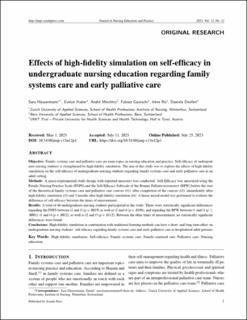Please use this identifier to cite or link to this item:
https://doi.org/10.21256/zhaw-28700| Publication type: | Article in scientific journal |
| Type of review: | Peer review (publication) |
| Title: | Effects of high-fidelity simulation on self-efficacy in undergraduate nursing education regarding family systems care and early palliative care |
| Authors: | Häusermann, Sara Ursula Huber, Evelyn Meichtry, André Gautschi, Fabian Ris, Irène Deufert, Daniela |
| et. al: | No |
| DOI: | 10.5430/jnep.v13n12p1 10.21256/zhaw-28700 |
| Published in: | Journal of Nursing Education and Practice |
| Volume(Issue): | 13 |
| Issue: | 12 |
| Issue Date: | 2023 |
| Publisher / Ed. Institution: | Sciedu Press |
| ISSN: | 1925-4040 1925-4059 |
| Language: | English |
| Subjects: | High-fidelity simulation; Self-efficacy; Family systems care; Family-centered care; Palliative care; Nursing education; Gesundheitswesen; Pflege-Ausbildung |
| Subject (DDC): | 378: Higher education 610.73: Nursing |
| Abstract: | Objective: Family systems care and palliative care are main topics in nursing education and practice. Self-efficacy of undergraduate nursing students is strengthened by high-fidelity simulation. The aim of this study was to explore the effects of high-fidelity simulation on the self-efficacy of undergraduate nursing students regarding family systems care and early palliative care in an adult setting. Methods: A quasi-experimental study design with repeated measures was conducted. Self-Efficacy was measured using the Family Nursing Practice Scale (FNPS) and the Self-Efficacy-Subscale of the Bonner Palliativwissenstest (BPW) before the start of the theoretical family systems care and palliative care courses (t1), after completion of the courses (t2), immediately after high-fidelity simulation (t3) and 3 months after high-fidelity simulation (t4). A linear mixed model was performed to evaluate the difference of self-efficacy between the times of measurement. Results: A total of 46 undergraduate nursing students participated in the study. There were statistically significant differences regarding the FNPS between t1 and t3 (p = .0019) as well as t1 and t4 (p = .0198), and regarding the BPW between t1 and t3 (p ≤ .0001), t1 and t4 (p = .0012), as well as t2 and t3 (p = .0112). Between the other times of measurement, no statistically significant differences were found. Conclusions: High-fidelity simulation in combination with traditional learning methods can have a short- and long-term effect on undergraduate nursing students’ self-efficacy regarding family systems care and early palliative care in hospitalized adult patients. |
| URI: | https://digitalcollection.zhaw.ch/handle/11475/28700 |
| Fulltext version: | Published version |
| License (according to publishing contract): | CC BY 4.0: Attribution 4.0 International |
| Departement: | School of Health Sciences |
| Organisational Unit: | Institute of Nursing (IPF) |
| Appears in collections: | Publikationen Gesundheit |
Files in This Item:
| File | Description | Size | Format | |
|---|---|---|---|---|
| 2023_Haeusermann-etal_Effects-high-fidelity-simulation-on-self-efficacy-in-undergraduate-nursing-education_ScieduPress.pdf | 351.4 kB | Adobe PDF |  View/Open |
Show full item record
Häusermann, S. U., Huber, E., Meichtry, A., Gautschi, F., Ris, I., & Deufert, D. (2023). Effects of high-fidelity simulation on self-efficacy in undergraduate nursing education regarding family systems care and early palliative care. Journal of Nursing Education and Practice, 13(12). https://doi.org/10.5430/jnep.v13n12p1
Häusermann, S.U. et al. (2023) ‘Effects of high-fidelity simulation on self-efficacy in undergraduate nursing education regarding family systems care and early palliative care’, Journal of Nursing Education and Practice, 13(12). Available at: https://doi.org/10.5430/jnep.v13n12p1.
S. U. Häusermann, E. Huber, A. Meichtry, F. Gautschi, I. Ris, and D. Deufert, “Effects of high-fidelity simulation on self-efficacy in undergraduate nursing education regarding family systems care and early palliative care,” Journal of Nursing Education and Practice, vol. 13, no. 12, 2023, doi: 10.5430/jnep.v13n12p1.
HÄUSERMANN, Sara Ursula, Evelyn HUBER, André MEICHTRY, Fabian GAUTSCHI, Irène RIS und Daniela DEUFERT, 2023. Effects of high-fidelity simulation on self-efficacy in undergraduate nursing education regarding family systems care and early palliative care. Journal of Nursing Education and Practice. 2023. Bd. 13, Nr. 12. DOI 10.5430/jnep.v13n12p1
Häusermann, Sara Ursula, Evelyn Huber, André Meichtry, Fabian Gautschi, Irène Ris, and Daniela Deufert. 2023. “Effects of High-Fidelity Simulation on Self-Efficacy in Undergraduate Nursing Education Regarding Family Systems Care and Early Palliative Care.” Journal of Nursing Education and Practice 13 (12). https://doi.org/10.5430/jnep.v13n12p1.
Häusermann, Sara Ursula, et al. “Effects of High-Fidelity Simulation on Self-Efficacy in Undergraduate Nursing Education Regarding Family Systems Care and Early Palliative Care.” Journal of Nursing Education and Practice, vol. 13, no. 12, 2023, https://doi.org/10.5430/jnep.v13n12p1.
Items in DSpace are protected by copyright, with all rights reserved, unless otherwise indicated.